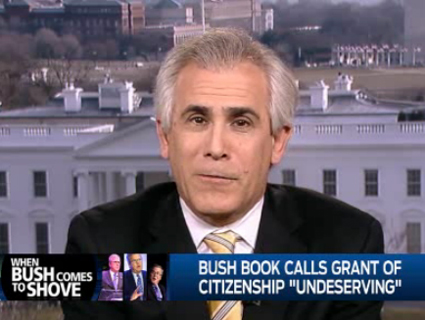
<a href="http://www.flickr.com/photos/circulating/4364341436/" target="_blank">Flickr/circulating</a>
UPDATE 03/19/2013 3:26 PM PST: It appears Paul does support a path to citizenship, he just doesn’t want to call it that.
Sen. Rand Paul (R-Ky.) endorsed a path to legalization—but not citizenship*—for unauthorized immigrants in the United States at a speech before the Hispanic Chamber of Commerce Tuesday, another step on Paul’s short, steep journey to moderation on immigration reform.
“If you wish to work, if you wish to live and work in America, then we will find a place for you,” Paul said Tuesday. “Somewhere along the line Republicans have failed to understand and articulate that immigrants are an asset to America, not a liability.”
Though early reports indicated Paul would endorse a path to citizenship, his speech mirrors a Washington Times column Paul made in February, when he endorsed legalization for undocumented immigrants but equivocated on the issue of citizenship.
“Would I hope that when they become citizens, these new immigrants will remember Republicans who made this happen? Yes,” wrote Paul in February, while later referred to “normalizing” or “legalizing” undocumented immigrants rather than granting them citizenship. “But my support for immigration reform comes not from political expediency but because it’s the right thing to do.” Paul also wrote that undocumented immigrants eligible for the DREAM Act—those brought to the US as children who are poised to go to college or join the military—should be legalized first. “I would start with Dream Act kids, children brought here illegally as minors.”
Paul has come a long way on immigration. In 2008, he was a believer in the “Amero” conspiracy—the secret plan to merge Canada, the United States, and Mexico and create a “borderless mass continent” under a single currency called the “Amero.” During his 2010 Senate run, when he campaigned as a tea party insurgent, he struck a hard line on immigration. “We shouldn’t provide an easy route to citizenship,” Paul said in 2010 during an interview with Russia Today. In the same interview, Paul rejected the guarantee of birthright citizenship in the 14th Amendment: “We’re the only country that I know that allows people to come in illegally, have a baby, and then that baby becomes a citizen. And I think that should stop also.” Another reason Paul opposed immigration reform and birthright citizenship? “A lot of this is about demographics,” Paul said during the RT interview. “If you look at new immigrants from Mexico, they register 3-to-1 Democrat, so the Democrat Party is for easy citizenship and for allowing them to vote.”
Here’s the video:
In 2011, Paul followed up on his opposition to birthright citizenship by cosponsoring a bill with Sen. David Vitter (R-La.) to end it.
On his campaign website in 2010, Paul endorsed making English “the official language of all documents and contracts.” He wanted “an underground electric fence, with helicopter stations to respond quickly to breaches of the border.” He supported Arizona’s harsh anti-immigration law, part of which was struck down by the Supreme Court. Paul insisted in his speech Tuesday that security must be a component of comprehensive immigration reform, abandoning the electrified fence idea but insisting on “drones, satellite, and physical barriers, vigilant deportation of criminals, and increased patrols” to help secure the border. (Prior security benchmarks have largely been met, and border crossings are way down, but on the right it’s an article of faith that nothing has been done.)
The significance of Paul’s shift shouldn’t be understated. While fiscal issues were the catalyst for the tea party, according to a study by Theda Skocpol, a Harvard political scientist, its adherents are also united by hostility towards undocumented immigrants. Liberals might have dismissed Paul’s 13-hour filibuster of Obama’s nominee for CIA director over drones as grandstanding, but Paul’s shift on immigration is, at least in part, an act of defiance towards the movement that put him in office.
Still, legalization without citizenship is a nonstarter for comprehensive immigration reform supporters, who say it would create a large permanent group of second-class citizens.
Paul has yet to join the GOP’s big stars in supporting path to citizenship a group that includes Sen. Marco Rubio (R-Fla.), Rep. Paul Ryan (R-Wis.), and Jeb Bush (R-Fla.). Sen. Ted Cruz (R-Texas), who joined Paul during his drone filibuster, still opposes a path to citizenship.
Passage of an immigration reform bill that guarantees a path to citizenship for the nearly 11 million undocumented immigrants in the United States depends on how many GOPers in the House and Senate decide to follow the path of Marco Rubio, rather than that of Cruz. Although he’s come along way from his original hardline positions, Paul remains somewhere between the two.
Correction: An earlier version of this post erroneously stated that Paul now supports a path to citizenship; he does not.












